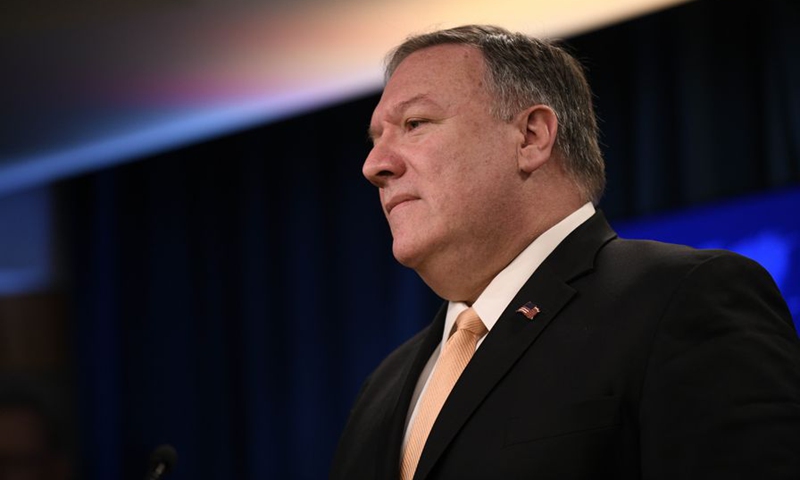Pompeo’s last foreign tour will be no victory lap: Global Times editorial
Source: Global Times Published: 2020/10/25 20:04:14

US Secretary of State Mike Pompeo speaks during a press briefing in Washington D.C., the United States, April 22, 2019. (Photo: Xinhua)
US Secretary of State Mike Pompeo on Sunday kicked off his last foreign trip before the US presidential election, with India, the Maldives, Sri Lanka and Indonesia on his itinerary.Top of his agenda is to mobilize those countries to confront China alongside with the US.
In New Delhi, the US and India, two of the countries hit hardest by the COVID-19 pandemic, will hold the 2+2 Ministerial Dialogue and are likely to sign the Basic Exchange and Cooperation Agreement that will allow for expanded military intelligence sharing. In the Maldives and Sri Lanka, it is anticipated that Pompeo will disparage the economic cooperation the two countries have been conducting with China and encourage them to seek "economic independence." He is likely to incite Jakarta to be tougher on Beijing over the South China Sea issue and tout US arms in Indonesia.
The trip could be regarded as a chance to summarize Pompeo's nearly three-year tenure as the secretary of state under the Trump administration. His term of office can be summarized in one sentence - he has pushed an all-round confrontation against China and endeavored to form an "anti-China united front" on the international stage.
With a clear anti-China attitude, Pompeo has bluffed his way in dealing with China. However, although he has done a lot, he gained only a little because what he advocates is detached from the basic reality of a gigantic China-US economic cooperation and runs counter to international common sense that countries should make policies based on their own national interests.
The purpose for India to move closer to the US is to increase India's leverage in negotiating border issues with China. India is China's neighbor and its strength is weaker than China's. Will New Delhi stand at the forefront of the US anti-China line? It is not that silly. US-India cooperation may make China unhappy, but it will not exert psychological pressure that could force China to make strategic concessions.
The Maldives and Sri Lanka are two small countries whose interests lie in keeping sound relations with all major powers in order to gain more investment and attract more tourists. The US will not invest in them as they attract few American tourists. But since the US secretary of state proposed a visit, the two countries will have to warmly welcome him. The two countries will not make too much fuss or make any promises. That's all. China has injected dynamics in the economic development of the two Asian countries, which have no reason to go against China just to cozy up to the US.
Indonesia is the largest country in Southeast Asia. It once bought military jets from the US and had to withstand a cessation in the supply of jet components due to US sanctions. Jakarta will not forget that. It is quite easy for Indonesia to figure out from which country - China or the US - it can gain more respect and development profit.
There is no serious dispute over the South China Sea between Jakarta and Beijing, and the two sides have effectively managed their divergences. The core task of Indonesia is to develop itself rather than to confront a certain big country or to act as a US pawn. Jakarta's wisdom will and shall never be humiliated by a white centralist like Pompeo.
The visit to four Asian countries will be a gloomy closing tour for Pompeo. As the secretary of state of the country hit hardest by COVID-19, Pompeo has traveled more frequently than his counterparts from other countries. This has increased the risk of spreading the coronavirus. Meanwhile, he has been spreading political viruses and fanning the flames of antagonism in the world. It is believed that many countries have ambivalent feelings about receiving him, because he brings no constructive outcomes but instead hegemonic demands to which the host countries can hardly respond.
China is the largest or main trading partner of many countries Pompeo has paid visits to. He asks them to take sides. But the question is, why should they? Being such a bully, Washington will only find itself as welcome as a storm.
Pompeo is one of the worst secretaries of state in US history, but he feels quite complacent. He thinks he can change the logic of international relations in the era of globalization with his inflammatory articles that will see him honored in history.
But he will end up being ridiculed by history as a political clown because he acts against the historical trend and refuses to face up to reality.
Posted in: EDITORIAL